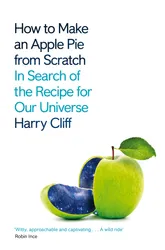At the end of this book, the author includes an actual recipe for apple pie, assuming that by then the reader has constructed enough of the rest of the universe to be able to buy the necessary ingredients from a local supermarket. My commitment to reading this book did not extend to actually following the recipe and making a pie, so I can’t comment on the quality of the recipe. But I can comment on the rest of the book, which is a top-down investigation into what an apple pie (and indeed the rest of the universe) is actually made from.
The apple pie idea comes from something Carl Sagan said in his Cosmos TV series: “If you wish to make an apple pie from scratch, you must first invent the universe.” So really, this book is about what science has learned about what the universe is made from. After a home experiment in which the author attempts to discover the chemical elements contained in an apple pie, by burning it over a Bunsen burner, we fairly quickly leave the apple pie itself behind and get stuck into chemistry, molecules, atoms and then deeper into subatomic particles, the world of quantum mechanics, the standard model, and even the speculative physics beyond that.
This top-down approach, starting with the everyday things we can see and touch, and going deeper into smaller and more fundamental levels roughly mirrors the order in which science has been able to uncover the nature of reality. So near the beginning of the book we learn about scientists like Newton and Faraday, and later on we get Einstein and then the scientists who today are probing sub-atomic particles with colliders.
The author himself is a physicist who works on one of the experiments at CERN. The book includes a lot of detail about what we’ve learned from the Large Hadron Collider at CERN and the ways that the experiments there have let us probe the nature of matter and energy. As well as the author’s own experiences at CERN, he takes some field trips to look at other experiments that are probing the universe, and to talk to the scientists conducting those experiments. These include the LIGO experiment to detect gravitational waves, and a really interesting experiment that aims to measure the shape of an electron, in order to detect the possible presence of new quantum fields that haven’t been discovered yet.
Towards the end of the book, as we reach the limits of scientific knowledge, the author takes a more philosophical tone. Theories about quantum gravity, how matter came to dominate over antimatter in the early universe, and how the universe came to exist in the first place, are all very speculative. There are many things we don’t understand about our universe, and this has caused some to speculate about whether we will ever understand them, and that perhaps we are already nearing the limits of what it’s possible to learn about our universe.
I found this book absolutely fascinating. I’ve read a number of books that cover fundamental physics at this point, but this one covered some topics that I wasn’t so familiar with, like quantum fields. I learned about something called a Sphaleron which I had never heard of before. (In the book it’s suggested that it may have had something to do with the problem of understanding how matter came to dominate over antimatter in the early universe.) There are some good explanatory diagrams and good use of everyday analogies to help convey challenging concepts. There is also a lot of witty humour in this book. I found it very entertaining to read, as well as provoking lots of interesting meditations on the nature of reality and the limits of scientific investigation.
